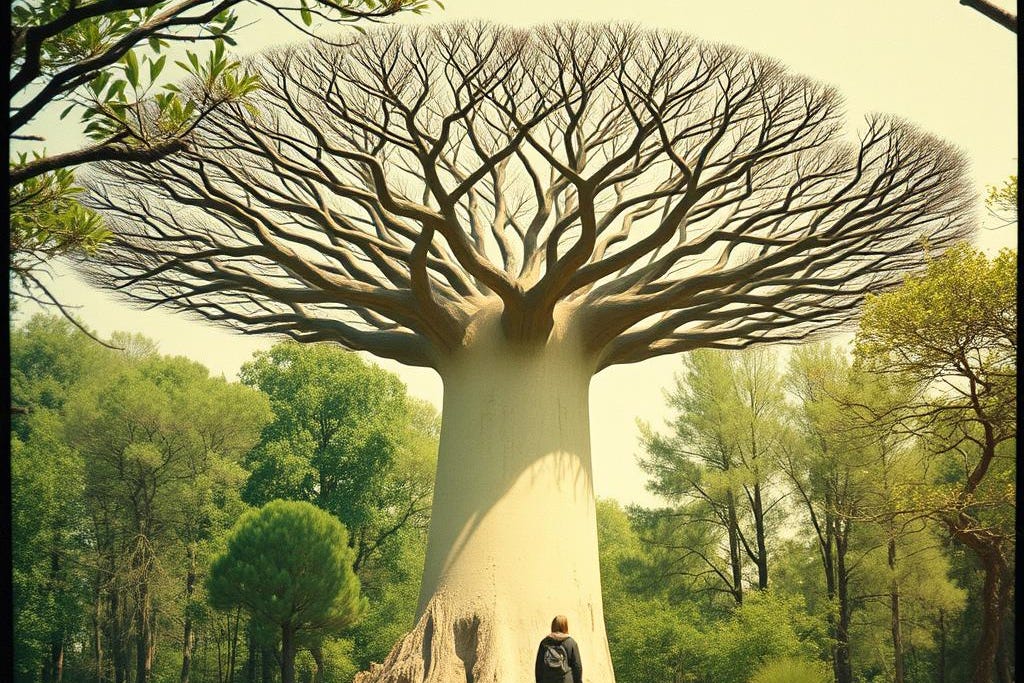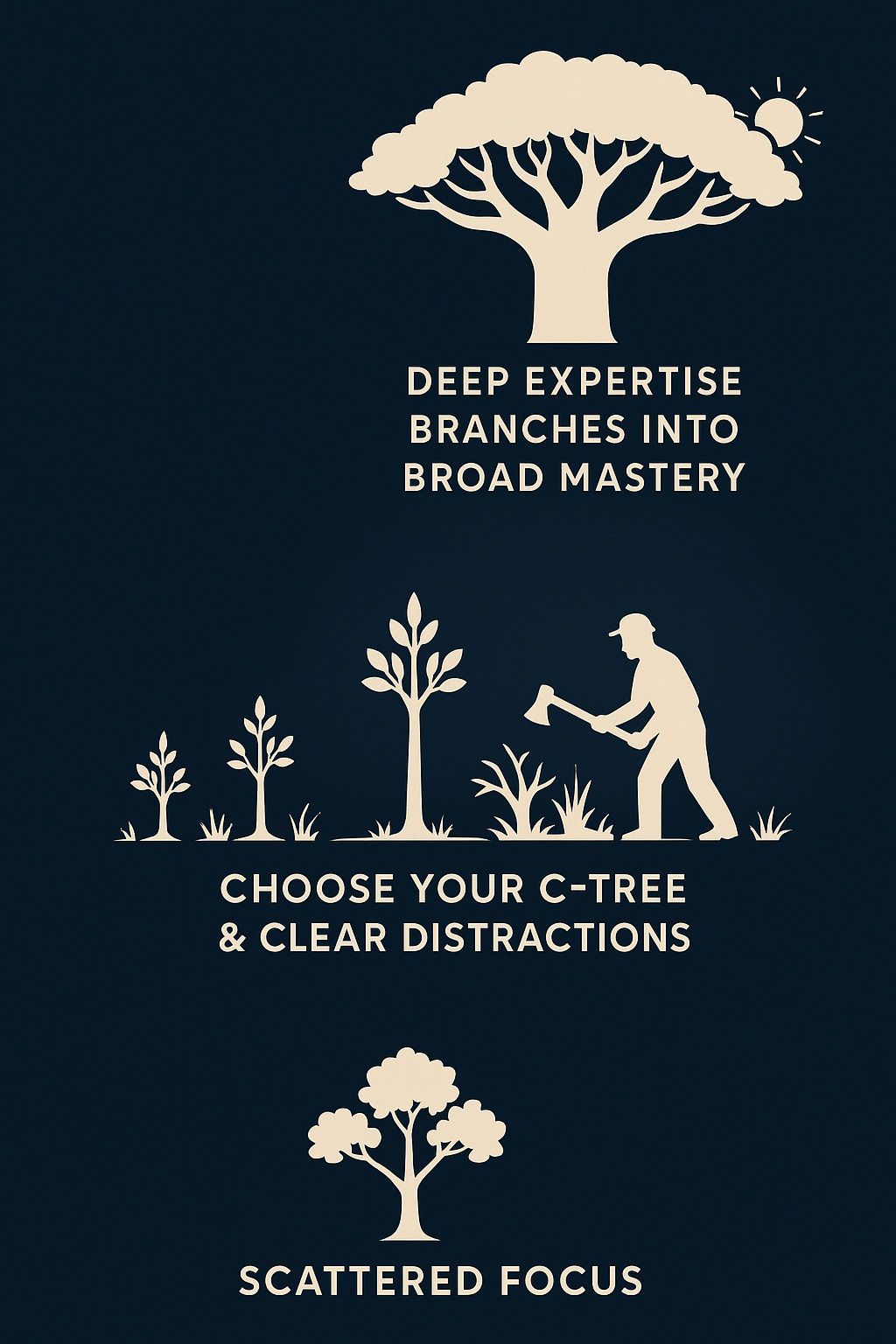A professor told me I'd never be a surgeon. I'm now department head.
The Baobab Principle
Most people feel lost.
They don't know what to do with their lives.
They were never told how to figure that out. And if so, they got the wrong manual.
It happened to me too.
There were many times when I didn't know what to do with my life professionally.
Too many interests. Too many options.
Doctor, biologist, entrepreneur, movie producer, musician, artist or writer?
The possibilities felt endless… and at the same time terrifying.
Coming from a dynasty of doctors and because I had the fewest objections and strong enough general interest in the subject - I ended up with medicine.
As my mother tried to pitch it: "You have the most options with medicine, if you end up disliking patients, just become pathologist."
Not exactly the "I have to help people" kind of story, but hey, that’s life.
So I did medicine. I maxed out the study experience as far as possible by studying in different cities and countries. It was a great time. But the more I neared the end of my studies the more confused and doubtful I became.
I grew resentful of a resentment to university hospital medicine and the science and publication apparatus.
I grew resentful of internal medicine as a state-perpetuating system instead of root cause treatment.
I grew resentful of a system that sells high-fructose corn sirup based products in the basement and offer diabetes and kidney treatment in the floor above.
I had become disillusioned with 95% of the subspecialties.
I liked surgery though because of it's clear before-broken-after-fixed baseline premise. But I had a lot of prejudices and fixed ideas about how surgical education works, how outdated it was.
So I feared the day, when I would officially become a doctor and had to decide what to do with that.
I had begun studying economics in parallel to medicine and come to the same paralyzing conclusion with regards to job options in that field. I had also taken a class on entrepreneurship and started two startups with a friend. Both failed miserably because we tried to focus on only CEO type of work from day one.
In short I was an overeducated mess.
Nothing felt right.
I was afraid of having wasted years on wrong goals.
I tried to solve the problem with my head.
To solve my problem, I followed common advice and tried to "find my passion".
Easier said then done. I had a million interests but nothing that checked the passion box.
Over a couple of years I tried
journaling the hell out of me to find patterns
contacting my higher self
doing every woo-woo exercise in the books
endless pro/contra lists
Ikigai
Mindmapping
Countless exercises from self-help books and courses
To no avail. I still didn't really know what to do. Or to be more precise, didn't really feel what to do with my life.
I went on a leave of absence from medicine to find answers unrestrained from the shackles of daily work.
In the picturesque port of Elba while on a sailing trip, I read Cal Newports book "So good they can't ignore you".
In a nutshell, the book claims that we have it backwards.
To have a fulfilling career - high pay, high agency and high satisfaction - you first have to become really really good at something.
The radical idea:
First, become valuable. Then, passion follows.
In short, you have to focus.
C-trees
I like visual thinking, it helps me a lot with making sense of things.
One idea that I learned from a forester is the concept of c-trees.
The "C-tree" - the central tree - is a tree that is identified as a candidate for exceptional growth. Once identified foresters then remove all other trees around that tree as well as the underwood. With that the c-tree gets a maximum of nutrients and sunlight.
Whatever area that is you decided to focus on - treat it like a c-tree.
I struggled with this idea for a very long time, because I feared of losing access to all the other interesting trees around.
During one of my highly recommended forest-bathing sessions I looked up and realized what c-trees do when they come to the top:
They branch out and create that giant umbrella at the top.
It is the same with skills and knowledge.
Once developed to a top level you can easily branch out to other areas.
The African Baobap tree is the perfect example of an extremely large, extremely straight and extremely branchy tree.
Become the Baobap c-tree.
Simultaneously - while fostering your c-tree - you can always keep planting additional (c)-trees.
This is how focused mastery in one area actually enables broader exploration in life, rather than limiting it.
The higher up you are when you start branching, the more space and sunlight you get - and the faster and broader you can branch.
How do you identify your c-tree?
Just pick one you like.
Your brains craves a more complicated system to choose. But there is not.
It is that dumb. It is that simple.
Now making that c-tree grow fast and strong requires though three essential things :
Humbleness
Persistance
Hard Work
Coming from adolescence expecting the world to just cater to my wants, I lacked all three traits.
Humbleness
The idea of a humble apprentice who factually doesn't know a thing and can't do a thing, was something I was actively opposing. Both in medicine and in general.
Focus on growing your roots as a seedling.
It was a mix of a life-altering meditation retreat and countless discussions with colleagues, family and friends that opened me up.
To accept that I have to start from nothing to become something.
A seemingly obvious sentence helped this transition:
"Not everything in life is supposed to be fun".
For some inexplicable reason I thought that it is supposed to be. And if it's not, something is wrong.
Persistence
This quote from Woody Allen encapsulates the idea of persistence perfectly
"80% of success is just showing up".
A friend and colleague of mine happened to be a former national champion in Kayaking. I was impressed and asked him how he had achieved that. He didn't really know, he explained. There were much more capable people around him in the beginning, but one by one they dropped out over time for various reasons. He was the only one left.
I have now witnessed countless times the truth in this statement and the power of persistence.
The vast majority of people are quitters. They give up.
All you have to do is to keep showing up again and again.
For years I had this picture as my computer's wallpaper to remind of this daily.
Trees keep on growing, regardless of the weather.
Hard work
One thing is showing up to work. The other thing is to actually do the work. And it is especially the hard work that exponentially brings the benefits you are after.
Because - again - 90% of people are actively avoiding to work. Like Donald Duck they spent a vast amount of energy on trying to not having to do (the hard) things.
The sooner you realize this, the sooner this becomes your unfair advantage. Rare and or top skills are the product of hard work.
Hard work is hard work because it's hard.
It can't be easy by definition.
Identify what the hard work with the biggest leverage is, then focus on that.
It is the leapfrog, the one that catapults you the farthest.
Eat that leapfrog first - every day.
The easiest way to identify the leapfrog is to follow your resistance.
It is frequently the one thing you are actively avoiding, that you should be doing.
Feel the resistance and do it anyway.
Become mahagoni.
To sum it up:
If you don't know what to do with your life:
Pick one thing you like more than other things.
Set a timer for 10 years and work on becoming really good at it.
Happiness, passion and success will follow along.
Feeling overwhelmed by options and ready to find your C-tree? I'm putting together a small group to share practical tools and provide personalized guidance. If you are interested, reply with "Baobap" and let me know where you are stuck.
To more in life,
Nicco
Listen to the song for this post:






Baobab 🌳🙏🏼